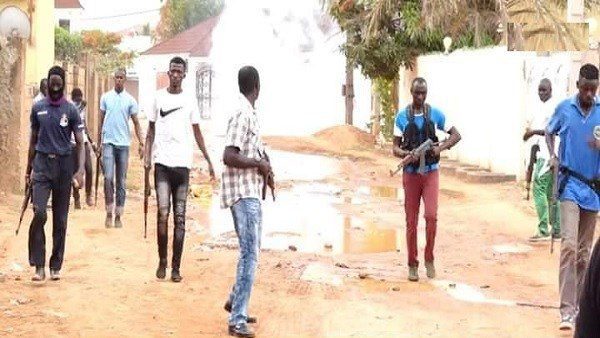Last week witnessed a series of wildcat protests in the streets of The Gambia as political tensions mount four months ahead of the country’s so-called hour of truth in December.
The catalyst for the spontaneous crisis which enveloped Brikama and some suburbs of the country’s biggest town Serrekunda had unmasked pent-up frustration with the running of local councils and the conduct of the security forces.
It all began last Wednesday as bands of marauding youths of Serrekunda took to the streets to protest the death in police custody of a young trader.
Ousman Darboe, a certified asthmatic patient was held for days by the police anti-crime unit after it emerged that he was involved in the dubious purchase of a television set which was suspected to have been a stolen item.
Local reports say although he was initially freed, the PIU had ordered him to be reporting to the station where he was eventually detained and allegedly tortured shortly before he died.
Fury over his death had spread like wildfire, as his relatives, friends and associates vented their rage onto the streets of Serrekunda, setting fire to the home of the head of the anti-crime squadron in the suburb of Ebo Town.
The main police station serving the suburb of Bakoteh was torched to the ground by angry mobs who fought running battles with tear-gas throwing paramilitaries.
The youth accused the PIU of being heavy-handed reminiscent of former president Yahya Jammeh’s rule when demonstrations which were few and far between during his 22-year rule were put down with muscular retribution.
Almost simultaneously another demonstration was taking place in Brikama under the OccupyBAC protest hashtag, spearheaded by angry youths disenchanted with what they called the lack of development in the area when compared to the more prosperous municipalities of Kanifing and Banjul.
Market vendors who featured prominently complained that their taxes are not being utilized to provide them essential social services especially in the market which is ridden with shacks.
Heavily armed paramilitaries moved in to disperse the protesters who had set fire to car tires and tree trunks on the town’s major roads.
The number of wounded in the ensuing clashes had reached multiple figures while scores had been detained.
“We have not seeing a departure from the iron-fisted days of the past as far as handling street protests are concerned” said Momodou Ceesay who was part of the Serrekunda protest.
Ceesay joined the protest feeling a raging sense of injustice over how trader Ousman Darboe was allegedly mishandled by the PIU.
“It’s like Jammeh left but his old ways of doing things have remained with us to this day” another protester who wished for anonymity interjected.
However, others like Wuyeh Dem blame it all on Gambia’s newfound democracy.
“Since Gambians realized that Jammeh was no longer around to stop them, they have used every occasion to occupy the streets even for the flimsiest of reasons in the name of democracy” he added.
Dem said under the new dispensation beggars would feel they have a right to take to the streets if they are not receiving enough alms from the public.
Analysts say these recent protests are a dress rehearsal for December, the do-or- die month for activists determined to shoot down President Barrow’s bid to stay in office until 2021 despite an election pledge he made to serve only three years as transition leader.
The three years Jotna movement dedicated to ending Barrow’s rule by that date have made it clear they are prepared for nothing short of seeing his departure.
According to the 1997 Gambian constitution stipulates that an elected president is mandated by the electorate to serve a full five-year term.
Barrow’s detractors insist, he and his coalition proteges were aware of this stipulation but went ahead with the three-year promise to step aside nonetheless.
Anticipating trouble, the Gambian police have been busy acquiring hot-water spraying vehicles and undergoing training on crowd control from sister forces in neighbouring Liberia.
The stage is therefore set for yet another political conflagration which would make or break Gambia’s slow march to the fully fledged democratic credentials she lost after Jammeh came to power in a coup in 1994.
WN/as/APA


